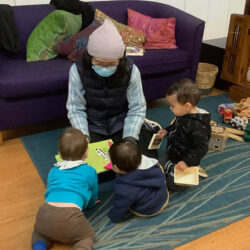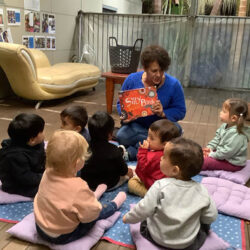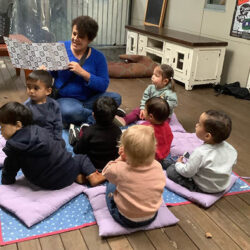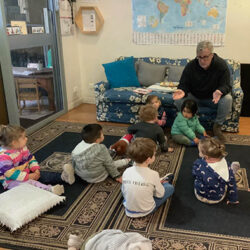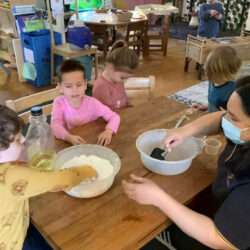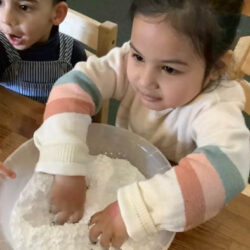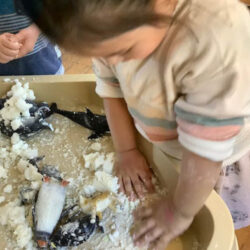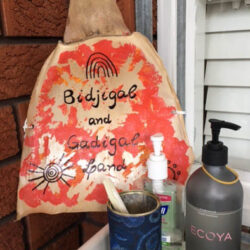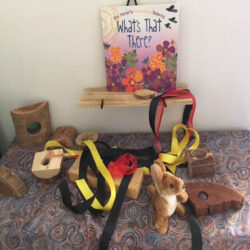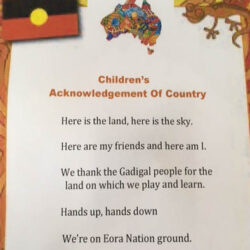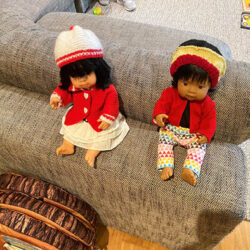Gorton House
Infants
Story by Educator Chamani
It has been a very interesting week for children in the Gorton House infants’ program. Everywhere I have looked I have seen the children showing interest in books. Maybe the current weather pattern has given them more opportunities to spend time indoors and has created the platform for them to spend more time with books. This was perfect timing, as this week was the beginning of NAIDOC Week.
We have a very good relationship with our parents and caregivers, and one of our parents brought us some beautiful Dream Time storybooks to share with our children. We took time to read these stories, and all of the children loved them. Before reading the books, we got together with the children to sing some of beautiful Aboriginal songs.
As we all know, reading supports our babies in many ways, for example, teaching them about communication, and introducing concepts such as numbers, letters, colours, and shapes in a fun way. Reading storybooks also, builds listening, memory, and vocabulary skills, and gives babies information about the world around them.
This week we had the opportunity to celebrate the histories, cultures and achievements of Aboriginal and Torres Strait Islander people. We came together as a small community, with children from many different cultures, to celebrate this special week as Australians. Most importantly, we all experienced another great opportunity to learn more about Aboriginal and Torres Strait Islander communities.
Toddlers
Story by Educator Russell
The children in Gorton House toddlers’ room have been exploring our cultural identities of late. Part of this journey has been the development of our Acknowledgement of Country. We’ve endeavoured to keep it simple and digestible, and will look at going a little more in-depth with this as our time in morning group becomes a little more refined and familiar. As it stands, we focus on what WAS and compare that to what IS. We highlight that, a long time ago, there were no cars, no trains, no houses as we know them (amongst other things), there was just the land, rivers, trees and animals. We acknowledge the traditional custodians of this land and relate to the children that they looked after the land and its elements, and that it’s our turn to help them to do that now.
It’s been a gentle lead in, but the kids are really responding to the concepts we’re raising. We’re looking forward to a plethora of opportunities unfolding over the coming weeks.
Johnson House
Preschool
Story by Educator Alisa
In Johnson House preschool, to follow up children’s interests in sorting animals according to their habitats, we set up a small world play experience with polar and arctic animals. Since these animals live in the polar region, the children also helped make some ‘snow dough’ using a similar recipe they had used in another experience. They took turns to observe the properties of cornflour and oil as they mixed these key ingredients. They shared that cornflour “is white as snow”, “soft”, “powdery” and “smooth”, while oil is “watery”, “stays on top of cornflour” and is “yellow.” When these ingredients were mixed together, the children shared that “it looked like cheese” and that the consistency “is like snow that you can make snow balls.”
We added the snow dough to the tuff tray, and the children continued their pretend play with the polar animals, as well as making some snow balls. The children examined all the animals that were made available to them. In previous discussions about changes in seasons and climates, the children have also shared their knowledge about “climate change,” “hibernation” and the ability of some animals to “camouflage.” The children continued to reminisce about their own holidays in the snow, and also re-enacted some familiar scenes from the popular movie ‘Frozen’. They moulded some snow dough into balls and pretended to have a snow ball fight. Some children took the reindeers and pretended one of them was Sven, the reindeer from Frozen, while others helped Santa to deliver presents or helped people to be transported from one place to another in snow.
Small world play experiences such as this encourage children’s creativity and imagination, and engages them in pretend play to safely re-enact scenes such as being in snow or being with polar animals. This also served as a platform for children to openly discuss the changes in seasons and climates, the attributes of animals and the challenges that even animals face due to the climate crisis.
Family Day Care Sydney Wide
Learning about First Nations Peoples
Story by Educator Support Officers Maureen and Barbara
One of our Family Day Care Sydney Wide goals for our National Quality Framework (NQF) Quality Improvement Plan is to support our Educators to embed Indigenous learning and perspectives into their daily practices and programs for children.
We role model learning experiences in our weekly playgroup sessions with children and Educators with the intention of inspiring change in the Educators’ services. It is so pleasing to visit and observe our Educators’ personal journeys. They are finding and developing so many learning provocations to encourage children’s conversations and questions about, and interest in, our First Nations people’s histories and cultures, as well as learning about reconciliation. For example, they have cushions, doll’s clothes and bedding and bean bags all made using ethically sourced Indigenous fabrics. They add signage to their services to acknowledge the traditional custodians of the land on which their services are located, and some have created their own Acknowledgement of Country to do with the children in their services.
Story by Educator Support Officer Alix
As we all continue our ongoing learning or re-learning of the true histories and cultures of the First Nation’s peoples, our ideas, knowledge, respect and values have begun to evolve and to have positive and informed impacts on how we plan for children’s learning.
Although this NAIDOC Week was heavily rained out for many outdoor celebrations and plans that our Educators may have had, it still opened up this spontaneous opportunity, that was led by our North Shore team of Educators, to collaborate in our online forum on how Educators are ethically procuring Indigenous resources for their services and the different and unique ways in which they are embedding Aboriginal and Torres Strait Islander perspectives into their programs every day.
A big part of this continuation of learning has been that taking part in cultural celebrations should go beyond one specific set date each year, and instead be weaved throughout children’s learning all year. It was wonderful to observe how our Educators used NAIDOC Week to move away from the often-tokenistic learning experiences of the past, to instead peer scaffold, share in constructive dialogue, collaborate and inspire each other another in how they are working to embed Indigenous perspectives and celebrate Aboriginal and Torres Strait Islander cultures with the respect they deserve.
